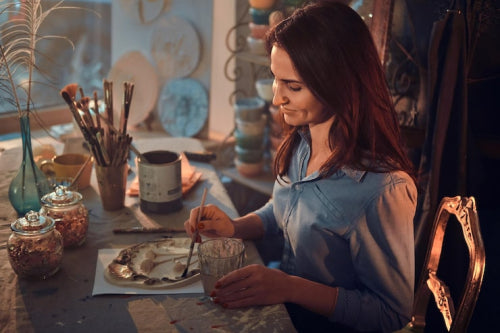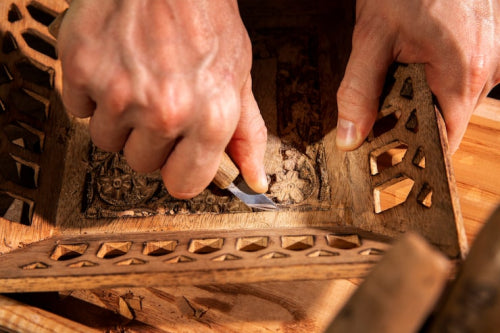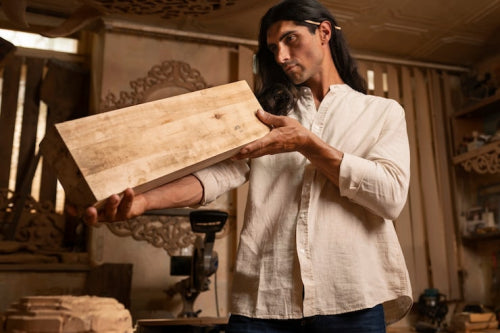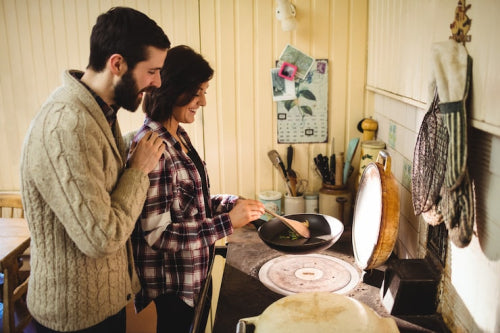Amid the serene lakes and historic palaces of Udaipur, a vibrant transformation is unfolding in India's furniture design landscape. Artisans, long rooted in the rhythmic traditions of woodworking, are now embracing modern tools CAD software, laser cutters, and a vision that fuses Rajasthan's rich craft heritage with contemporary global aesthetics. This isn't merely about crafting furniture; it's about Udaipur emerging as a dynamic hub for a new generation of designers who are redefining the essence of Indian handcrafted artistry, blending sustainability with innovation to captivate a growing audience.
Mass-market furniture lacks heart, filling rooms with bland, short-lived pieces. Frequent breakdowns spark frustration, as replacements erode style and sentiment. At MMC Wood Creations, Udaipur artisans shape heirloom furniture with enduring craftsmanship and cozy elegance, creating pieces that echo your identity, ensuring your home radiates warmth and timeless connection. Shop Now!
Crafting Tomorrow: Udaipur's Designers Redefine Furniture Heritage
Udaipur's woodworking tradition, renowned for its intricate joinery and durable Sheesham and Mango wood pieces, once graced royal courts. Today, a new cohort of designers is building on this legacy, driven by a commitment to sustainability and individuality. The MSME 2024 report highlights a 12% annual growth in artisan entrepreneurship across Western India, with Udaipur leading the charge. The city's bespoke creations are resonating with eco-conscious consumers in cities like Jaipur, Bangalore, and Mumbai, where demand for personalized, eco-certified furniture is soaring. These artisans are not just shaping wood they're shaping a cultural and commercial movement.
This resurgence mirrors a broader revival across India's craft capitals, from Jaipur's marble inlay workshops to Chennai's woodcarving enclaves. Yet Udaipur's designers distinguish themselves by seamlessly blending heritage with innovation, crafting pieces that feel both timeless and cutting-edge. This delicate balance is positioning Udaipur as a beacon of contemporary craftsmanship, drawing attention from design hubs nationwide.
Trends Redefining Udaipur's Craft Scene
Step into a Udaipur atelier, and you'll encounter a philosophy of material honesty. Designers are eschewing the glossy lacquers common in Mumbai and Pune showrooms, instead celebrating the natural grain of Sheesham and Mango wood. This minimalist approach, inspired by Scandinavian aesthetics but grounded in Rajasthani joinery, emphasizes raw textures and clean lines. One artisan, working in a sun-dappled studio, shared, “The wood's natural beauty should speak for itself, unmasked by artificial finishes.”
Sustainability is a cornerstone of this movement. Udaipur's artisans are adopting eco-labels, inspired by Hyderabad's circular economy models and Jaipur's craft clusters, which champion FSC-certified sourcing. According to the NID Ahmedabad's 2023 “Future of Craft” report, 68% of Rajasthan's new-age artisans prioritize reclaimed or sustainably sourced wood. Many studios are also integrating advanced tools, such as laser-cutting techniques borrowed from Bangalore's design-tech startups, to achieve intricate patterns with precision. The Rajasthan State Industrial Development Corporation's 2024 study notes that 45% of Udaipur's artisans are now using CAD software, signaling a digital transformation in traditional craft.
Elsewhere in India, artisans are experiencing similar boosts. For instance, a recent GST rate reduction from 12% to 5% on handicrafts in Odisha has made products like bamboo furniture more affordable, spurring demand. While Udaipur's furniture sector hasn't seen identical tax relief, the focus on sustainability aligns with this broader push to make handcrafted goods more competitive.
Profiles of Udaipur's Visionary Designers
Udaipur's design scene is illuminated by a diverse array of talents. One standout is a minimalist heirloom maker whose sleek tables and chairs marry Scandinavian geometry with Rajasthani dovetail joints. His work contrasts sharply with the ornate designs dominating Pune's studios, offering a fresh, understated elegance. Another artisan, the heritage interpreter, reimagines Marwari motifs swirling florals and geometric lattices in contemporary lounge sets that could headline Jaipur's craft revival fairs. Her creations weave Rajasthan's storied past into modern urban spaces.
The sustainable studio is another trailblazer, sourcing reclaimed Teak from Mumbai's restoration networks and industrial off-cuts from Hyderabad's fabrication units. Their modular shelves and upcycled benches embody a zero-waste ethos, proving that ethical production can yield stunning results. Meanwhile, the technologist-craftsman is pushing boundaries with AR-aided customization, inspired by Bangalore's design-tech ecosystem. His clients can visualize furniture in their homes before production begins, merging technology with craftsmanship. Each designer anchors their innovation in Udaipur's craft lineage, ensuring their work honors tradition while meeting modern demands.
This fusion of tradition and innovation echoes trends in other crafts, such as Uttar Pradesh's chikankari embroidery. A report on chikankari's evolution describes how this delicate art, generating Rs 2,800 crore in 2024-25, has transitioned from white-on-white embroidery to colorful fabrics and fusion with zari and Banarasi weaves. Similarly, Udaipur's designers are adapting traditional techniques to contemporary tastes, ensuring their craft remains relevant.
Collaborations and Expanding Markets
Udaipur's designers are breaking free from local constraints, with their work now featured in curated collections in Ahmedabad and Chennai concept stores. A notable partnership with Bangalore's The Purple Tree, a sustainable décor retailer, has amplified their reach, driving a 15% increase in furniture sales in 2024, per the India Handicrafts Export Council. Government initiatives, including the Khadi Village Industries Commission and SIDBI Craft Cluster Schemes, are bolstering this growth through mentorship and export readiness programs, enabling artisans to tap into global markets.
Yet challenges persist. Access to capital is a significant barrier, with Udaipur's artisan-startups struggling to secure funding compared to their peers in Mumbai or Hyderabad. The migration of skilled artisans to metro hubs like Chennai and Pune, drawn by higher wages, threatens the city's talent pool. Rising costs of legally sourced Sheesham and Teak, driven by stringent forestry regulations in Maharashtra and Karnataka, further complicate production. Additionally, the lack of robust IP protection, unlike Ahmedabad's design incubators, leaves Udaipur's innovative patterns vulnerable to replication.
Seizing New Opportunities
Despite these hurdles, Udaipur's design ecosystem is ripe with potential. The city's booming hospitality sector offers a lucrative market, with boutique resorts commissioning custom furniture for their spaces. E-commerce platforms, particularly Mumbai-based luxury craft portals, are expanding the digital footprint of Udaipur's artisans, connecting them with a broader audience. Educational partnerships with NID Ahmedabad and CEPT University are nurturing the next generation of artisan entrepreneurs, blending academic rigor with hands-on craft training. The Craft Sector Skill Council forecasts a 6.8% CAGR for Rajasthan's furniture exports from 2025 to 2030, underscoring strong global demand.
A Renaissance Rooted in Craft
Udaipur's designers are proving that tradition and modernity can coexist harmoniously. A faculty member from NID Ahmedabad observes, “Udaipur's ability to balance authenticity with scalability is unparalleled among India's craft hubs.” Analysts from Bangalore's Design Innovation Hub agree, highlighting the city's fusion of heritage and technology as a blueprint for India's craft renaissance. From Jaipur's marble inlays to Chennai's woodcarving traditions, Udaipur's influence is resonating across India's craft capitals. This lakeside city, with its skilled artisans, sustainable materials, and bold vision, is not just crafting furniture it's shaping a future where India's artisanal heritage thrives on a global stage, one meticulously crafted piece at a time.
Frequently Asked Questions
What makes Udaipur's furniture designers different from other craft hubs in India?
Udaipur's designers uniquely blend traditional Rajasthani woodworking techniques with modern innovation, using tools like CAD software and laser cutters while maintaining heritage craftsmanship. Unlike ornate designs from cities like Pune, Udaipur artisans emphasize material honesty with natural wood finishes and Scandinavian-inspired minimalism rooted in traditional joinery. Their focus on sustainability, with 68% prioritizing FSC-certified or reclaimed wood, combined with cutting-edge technology adoption, positions Udaipur as a leader in contemporary handcrafted furniture design.
How are Udaipur's furniture artisans incorporating sustainability into their designs?
Udaipur's designers are adopting eco-labels and sourcing reclaimed Teak from Mumbai restoration networks and industrial off-cuts from Hyderabad, embracing a zero-waste philosophy. Many studios use FSC-certified sustainable wood and celebrate natural grain patterns instead of artificial finishes, inspired by circular economy models from Hyderabad and Jaipur. This commitment to ethical production aligns with broader industry trends, making handcrafted furniture more competitive while appealing to eco-conscious consumers in major Indian cities.
What challenges do Udaipur furniture designers face in growing their businesses?
Despite growing demand, Udaipur's artisan-entrepreneurs struggle with limited access to capital compared to designers in Mumbai or Hyderabad, and face talent drain as skilled craftspeople migrate to metro cities for higher wages. Rising costs of legally sourced Sheesham and Teak wood due to stringent forestry regulations, combined with inadequate IP protection for innovative designs, pose significant operational challenges. However, government initiatives like SIDBI Craft Cluster Schemes and partnerships with sustainable retailers are helping artisans overcome these barriers and expand into national and global markets.
Disclaimer: The above helpful resources content contains personal opinions and experiences. The information provided is for general knowledge and does not constitute professional advice.
You may also be interested in: Timeless Furniture Trends That Outlast Seasonal Fads
Mass-market furniture lacks heart, filling rooms with bland, short-lived pieces. Frequent breakdowns spark frustration, as replacements erode style and sentiment. At MMC Wood Creations, Udaipur artisans shape heirloom furniture with enduring craftsmanship and cozy elegance, creating pieces that echo your identity, ensuring your home radiates warmth and timeless connection. Shop Now!
Powered by flareAI.co




